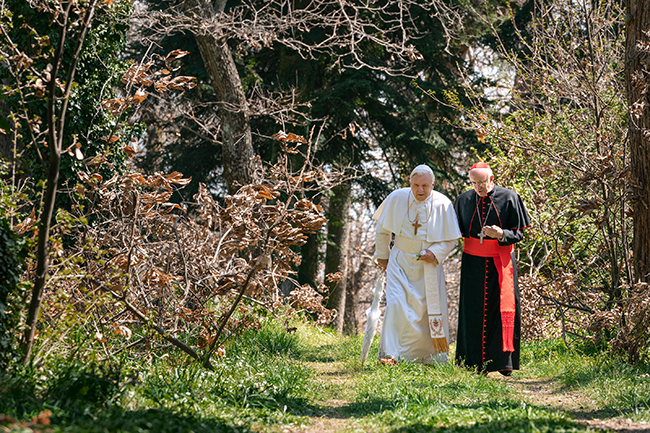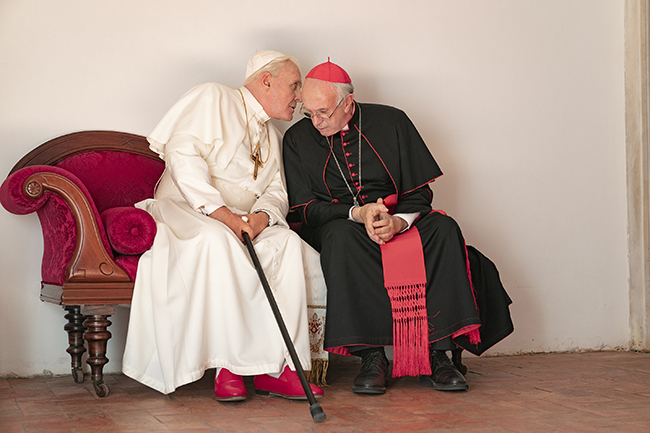By Emma Winters
April 29, 2020 — Much has been written about what’s true and what’s not in The Two Popes. The film, starring Anthony Hopkins as Pope Benedict and Jonathan Pryce as Pope Francis, features a two-day rendezvous between Pope Benedict and Cardinal Jorge Bergoglio—soon to become Pope Francis. The meeting is set in late 2012, amid accusations of banking corruption and sexual abuse cover-up against the Vatican.

Photo: CNS
Cardinal Bergoglio visits Pope Benedict in his summer residence, the Palace of Castel Gandolfo. He’s come to have Pope Benedict accept his retirement as bishop. Tired of defending the Church’s hardline stances, he believes he can do more good as a simple parish priest. The two men clash immediately.
“Would you prefer to walk?” asks Cardinal Bergoglio.
“Your shoelaces are untied.”
Pope Benedict rejects him. He also rejects his retirement papers. He calls Bergoglio one of his harshest critics. He says that the rejection of the Archbishop’s residence in Argentina is a referendum on other clerics. Married priests, homosexuality, divorced and remarried Catholics receiving communion—it’s all part the discussion. And that’s just the first three minutes of the visit.
This is a kind of dance. They never escalate the argument, only circle each other. One reaches for something specific, the other moves to a new topic or expands the conversation. It’s a great debate about what really matters. Also, Bergoglio’s shoes are not up to snuff. I have heard The Two Popes described as a “buddy movie.” To me, “odd couple” might be more accurate.
Pope Francis is affable and Pope Benedict bristly. Still, for me, it was Pope Benedict that was constantly surprising. He’s recorded a piano album at Abbey Road but isn’t familiar with the Beatles. His favorite television show is Kommissar Rex, an Austrian show about a crime fighting German Shepherd. He is grand in his declarations of who God is and the Church’s authority. He is humble as he shares his desolation, his inability to feel God’s presence. And of all the people he could have shared this with, he chooses Bergoglio—who he had told just a few hours ago: “I don’t agree with anything you say.”
I wish this meeting between the two living popes really happened. It is fiction.
Still, not everything in the film is full-blown fabrication. Flashbacks of Pope Francis’ life are interspersed throughout. Some of this is based in reality, including the parts of the film that show his imperfect leadership of the Jesuits during Argentina’s Dirty War.
The movie is also bookended by two very real events: the death of Pope John Paul II followed by the election of Pope Benedict XVI and Pope Benedict’s resignation followed by the election of Pope Francis. Real news footage that accompanies these papal transitions sets the stakes of the film.

Photo: CNS
“He’s going to stand up for dogma. He’s going to be a great pope. Oh my God!” says an exuberant woman of Cardinal Joseph Ratzinger, who has just been elected to the papacy and taken the name Benedict.
“I know Ratzinger. The Nazi shouldn’t have been elected,” one man counters with disgust just a few cuts later.
Anthony McCarten, writer of the play turned film, has said candidly that the movie is about conservatives and progressive “finding the middle ground” and coming into communion by listening. It’s really tempting to believe that conciliatory listening can happen in front of the screen. Just as it’s tempting to believe that Pope Benedict blessed his successor in advance, and that there are no divisions in the Church. I want to believe it.
Unfortunately, we have to do the work. At their best, movies like The Two Popes show us how to have difficult conversations. At their worst, they lull us into thinking the work of healing divisions within our Church is already done.
Last year as Joseph A. O’Hare Fellow at America Media, I had the opportunity to moderate the America | Catholic Movie Club. Doing this part of my job, which usually felt more like leisure than work, showed me that people are really hungry for smart, spiritual conversations about movies. With that in mind, I’m hopeful about the impact that The Two Popes can have on Catholics. As for me, a young Catholic who rarely backs away from political or spiritual differences, I can only pray: “Lord, make me as affable as Pope Francis in my disagreements and as willing as Pope Benedict to be personally vulnerable with those I disagree with. Even if none of this is true, God…you know what I mean.”
Emma Winters was the 2018-2019 Joseph A. O’Hare fellow at America Media, and during that time, she was moderator of the America | Catholic Movie Club. She is now communications coordinator for the Center for Migration Studies of New York, a Catholic think tank.